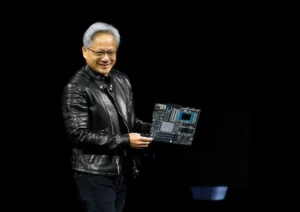
Title: The AI Revolution: A Call to Action for Humanity’s Future
The world is at the precipice of a technological singularity, and it is crucial that humanity takes control of its trajectory. The notion “If you’re not on the table, you’re on the menu” serves as a stark reminder of our collective responsibility to shape the future of Artificial Intelligence (AI). As we embark on this transformative journey, it is imperative that we acknowledge the risks and opportunities presented by AI and take proactive steps to ensure its benefits are equitably distributed.
The dichotomy between being “on the table” versus “on the menu” underscores the stark contrast between proactively engaging with AI’s implications and passively accepting its consequences. The consequences of inaction will be devastating, as individuals, communities, and businesses risk becoming unwitting pawns in a game they have no control over.
The imperative to take action is twofold. Firstly, it is crucial that we prioritize AI education and literacy, transcending the confines of the tech-savvy elite. Governments, schools, and organizations must invest in foundational AI training for the general public, empowering individuals with the knowledge necessary to engage thoughtfully with AI systems. This education can serve as a bulwark against the risk of unscrupulous AI development, fostering an environment where technology serves humanity rather than perpetuating biases.
Secondly, it is vital that we advocate for ethical AI development and governance. The onus lies on governments, tech companies, and advocacy groups to champion responsible AI practices. This necessitates a commitment to transparency, accountability, and inclusivity in the development of AI systems. Efforts such as the Partnership on AI, which aims to promote responsible AI development, can serve as beacons of hope for humanity’s future.
Moreover, it is essential that we create inclusive AI ecosystems that eschew traditional power structures and foster diversity in AI development. By supporting underrepresented groups in AI careers or promoting startups led by diverse founders, we can prevent technology from amplifying existing inequalities. This necessitates collaboration among governments, universities, and corporations to fund grants, incubators, and training for diverse individuals.
As the AI revolution gathers pace, it is our collective responsibility to seize control of its trajectory. The consequences of inaction will be dire – a world where AI serves as a tool for the privileged few at the expense of the many. It is time for humanity to recognize that being “on the menu” can no longer suffice; we must take an active role in shaping our collective future.
By embracing education, ethics, and inclusivity, we can forge a path where AI’s advantages are widely accessible, its risks mitigated, and its role in our lives balanced. The fate of humanity hangs in the balance – it is time for us to take action.
Source: www.forbes.com


